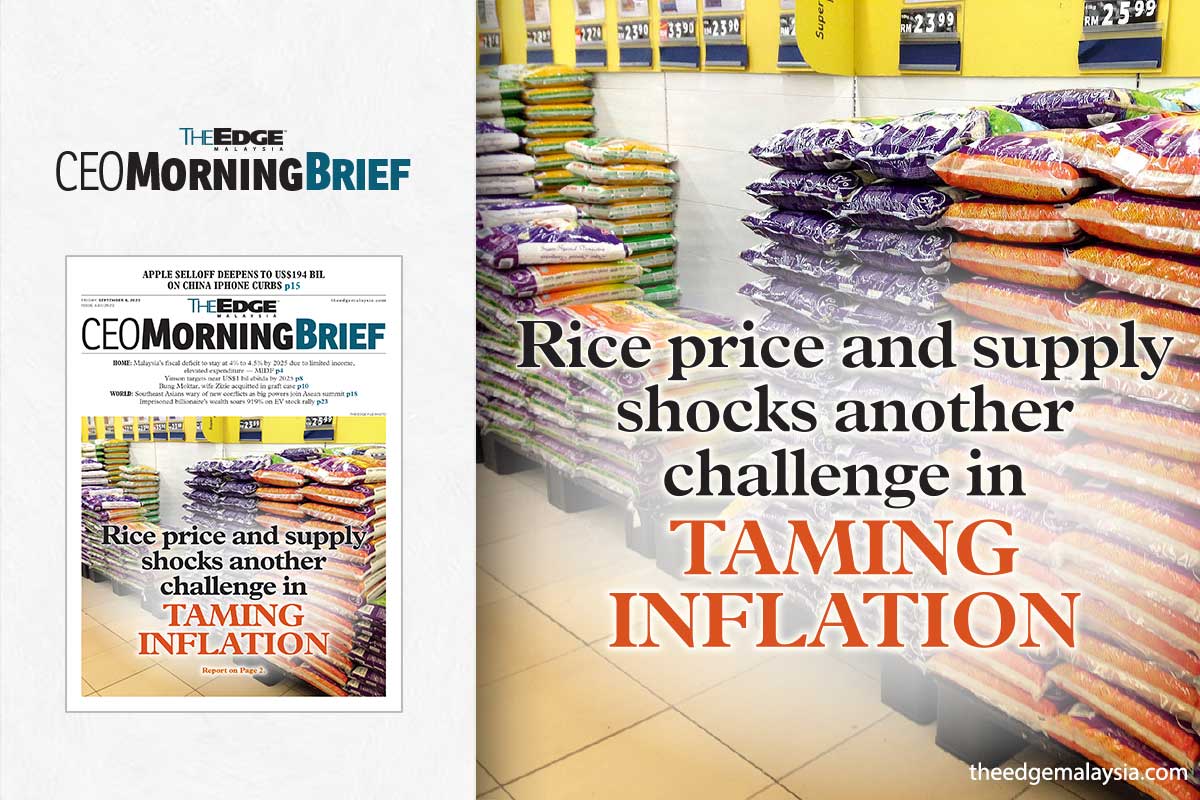
KUALA LUMPUR (Sept 8): A combination of increased import rice prices, concerns over supply shortages, and alleged manipulation by sellers could spell another challenge for the government to further rein in inflation.
On Thursday, Putrajaya imposed a 100 kilogram (kg) limit on purchases of cheaper, locally-produced white rice with immediate effect as Malaysia tackles supply troubles linked to India’s recent export curbs on the grain.
The government has also been conducting checks on commercial mills and wholesalers since August amid allegations of locally- produced rice being sold at the higher allowed imported rates, according to the Ministry of Agriculture and Food Security.
The latest bid to address supply woes of the local food staple was announced by the ministry’s Paddy and Rice Regulatory Division director general Azman Mahmood during a Budget 2024 Dialogue Session for the country’s padi and rice sector attended by industry players held on Thursday.
The decision, which will be in place until local supply normalises, was premised on the grain's supply disruption as a result of bulk purchases, especially by traders, Azman said.
Investigations found that some traders bought up to 7,000kg of locally-produced rice to save costs and make easy profits, he added.
“Due to this we are imposing this [purchase limit] restriction starting today. Each person can only buy 10 bags of ten kilos each or 100 kg [total],” he was reported as saying.
He noted that private individuals who fail to adhere to the purchase limit face a RM15,000 fine for their first offence and RM25,000 for subsequent offences, while companies face double the amount. Punitive actions on sellers may include cancellation of licenses, Azman added.
Concerns over supply and price manipulation of the product came at a time when imported price was officially raised this month by sole importer Padiberas Nasional Bhd (Bernas).
The 36% increase announced on Sept 1 to RM3,200 per tonne, from RM2,350 per tonne, was done on the back of factors including weakening currency exchange rate, high operating costs and the impact of white rice export ban announced by India beginning July.
One-third of rice consumed in Malaysia is imported, as the nation has a self-sufficient rate (SSR) of 65%.
In a speech ahead of the dialogue session, Agriculture and Food Security Minister Datuk Seri Mohamad Sabu admitted that the country “is facing a disruption in locally-produced white rice supply in several places”.
However, he reiterated that Malaysia’s local white rice prices are among the lowest in Southeast Asia at its capped RM2.60 per kg.
The country has rice inventories equivalent to 1½ months of consumption, he said. Malaysia's expected monthly rice requirement is 200,000 metric tons — with a per capita consumption of 79kg, he added.
Regionally, inflation has bottomed up in neighbouring countries like Thailand, Vietnam, Indonesia and the Philippines on the back of rising goods and energy prices, sparking concerns over second-round effects and higher-for-longer policy rates.
In Malaysia, food prices, one of the drivers of the consumer price index (CPI), grew 4.4% in July, down from its peak of 7.3% in November last year.
The headline inflation stood at 2% in July, from its peak of 4.7% in August last year. However, this is still elevated compared with around 1.6% seen in January 2020 before the pandemic.
Aside from food prices, Malaysia’s inflation in segments like energy has been less than its peers, on the back of subsidised prices of fuel and electricity.
The government has started reducing subsidies for electricity for commercial users since the start of this year and gradually included high-volume household users in 2H2022. Plans are also in the works to address the high subsidy for petrol and diesel, with mechanisms expected to be put in place next year at the earliest.
To receive CEO Morning Brief please click here.

